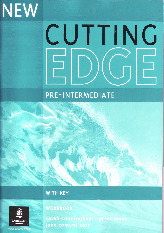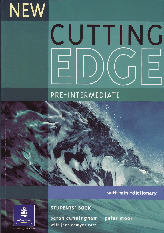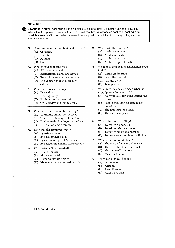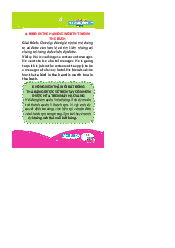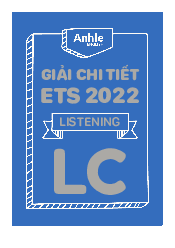



Preview text:
FOOD
1. What do you usually have for breakfast / lunch/ dinner?
At the beginning of each day, I will spend about twenty minutes having breakfast, for breakfast I usually
eat bread and drink milk , sometimes I will fry (phrai) rice and eggs myself to eat. At lunch, I will eat a
hearty (hát ti) meal with everyone in the family, the dishes (đi s t)
ị are not fixed (phích s t) ị , but my
mother will often cook dishes such as boiled (boi eo t )
ờ cabbage (ka bít) with braised (bruây z ) ờ meat,
fried (phờ rai) fish to eat with rice. And dinner is still very full of dishes cooked by my mother, but I don’t
eat rice but only eat fruits and vegetables (véts t bồồ) ơ
because I am afraid (ơ phây tờ) of being fat
2. How often do you eat out a week?
Because of the ongoing epidemic (e pi đe míc) , I usually eat at home. But if it was before, I used to eat
out twice a week , mostly with my friends after school in the afternoon. We will go to the sidewalk near
the lake and eat snacks like rice paper, baked (bếếch
) sweet potatoes (pơ tây tâu), sausages (sa s t) ị and drink lemon tea
3. Do you prefer eating at home or eating out? Probably (prom b li) ờ
both, because eating at home will ensure better food quality (qua l ti) ơ , a more
cozy (câu zi) family atmosphere (ét mót phia). But eating out also has a good thing that I will enjoy the
formal atmosphere in this restaurant (roét tơ ron) the food is more sophisticated (sơ phít ti cây t t) ự and beautiful
4. Do you take any vitamins or food supplements at the moment?
Yes, whenever I'm sick my mother often buys me some supplements (sắếp pờ li m n)
ừ . Or the girl whose period (pe ri
ớt) I will take some iron pills (piu)
5. Have you ever thought of becoming a vegetarian? Why? Why not?
I never thought I would be a vegetarian (ve z t
ơeo ri iếồn) . Because vegetarians won't be able to eat
protein from animals. I'm a meat lover (láp v )
ờ , dishes like skewers (s kiu ờ
ờ) , roast (roâu s t) ị duck
braised (bruâys) meat, fried (phờ rai) fish are my favorite dishes SPORTS
1. What sports do you enjoy playing or watching?
Sports have always been important to the health of all of us. As for myself, I enjoy playing sports such as
badminton, basketball, volleyball, and I like watching mainly athletics ( át th le tic) ơ and football.
2. Do you prefer playing or watching sports?
In between watching and playing sports, I would like to choose to prefer watching sports, because it will
not take much effort and I can watch it with my family members or close friends in my free time
3. Is there any sport you would like to play well?
Of course because this year during the Olympic season in Tokyo- Japan has added (ét đ t) ự a few new
sports. One of them I'm impressed (im p roét t ờ t)
ự with skateboarding (s t k
ị ếết bo đing), so I want to
learn and play well in that sport
4. Which sport did you have to do at school?
At school, during physical education classes, or at recess (ruy sét), my friends and I are free to move, play
the sports we like, or have in the lesson. To mention, there are also many such as badminton, basketball, long jump (dắmp)
, and the sport I both hate and fear the most is the high jump
5. Have you ever been to a big sporting event?
No, I have never been to a major sporting event (i ven). Because the places that hold big sports events
are often far away from where I live, and maybe even when I was young, my parents didn't let me go.
But I also got to go and watch the football tournament (tua n m ờ n)
ừ organized (o g nai t ơ ờ) by the commune (k
ơm miu) , the scale (s t k ị
ây) is not very big but there are a lot of people, and it is very fun TRANSPORT
1) When was the last time you travelled by train/coach/car/bus/plane?
The last time I travelled by car was on Tet last year, I went to a temple called Tay Yen Tu which is a famous
temple in Bac Giang. I went to the temple with my family . My family and I traveled by car which took an
hour and a half to get there. My father is a driver , because of the mountain road, he walks very slowly to
ensure safety. It’s spring, so it’s drizzly (đi z li) ờ , the wind is cold
2) In general, what kind of public transport do you prefer? Why?
When it comes to public (pắếp líc) transport , I like bicycles (bai si cồồ) the most. Because from the fourth grade ( g ruây) ờ
to the ninth grade, I went to school by bicycle. Therefore, I find that cycling can both
help exercise and protect the environment. No smoke, no petrol is a good vehicle (via cồồ)
3) Are you happy with the transport system in Hanoi? Why? Why not?
I think that I’m not satisfied (sát ti phai) with the transportation (troến s t pót t ị ây s n)
ừ system (sít t m) ừ in
Hanoi . Because at peak (pích) hours, almost every day there will be traffic jams. Some days I would be
stuck (stắếc) for about an hour, but other days it would take two or three hours to get there. In addition,
on rainy days, the road is flooded (ph lắết đ ờ t)
ự , making it impossible to travel normally, many
motorbikes and even cars have stalled (s t to) ị
on the spot (sịt pát)
4) Is there anything you would like to change about the transport system in Hanoi?
Yes, I hope that the transportation system in Hanoi is changed (choến đ )
ờ more. It is possible to
widen (woai đừn) more routes (rút th )
ờ to avoid traffic jams at peak hours. Or build subway
(sắếp guây) stations like developed countries. Besides, I hope to overcome the situation (si tiu ây
sừn) of flooded (ph lắết đ ờ
ựt) roads on rainy days
5) Why shouldn’t people use their phone while driving?
Because if people use mobile phones while driving, people will easily cause traffic accidents (ách si đ
ừn) . It is both dangerous to yourself and others. On the other hand, that behavior is a violation (vai lây s ơ n)
ừ of traffic safety (sếếp ti) laws and a lack of traffic culture (kắết trờ) MONEY
A. What do you spend most of your money on?
I spend most of my money on new clothes (c lâếu) ờ
and cosmetics (ko me tíc). I also buy shoes very often,
I buy many kinds of shoes from many different brands (b ran) ờ
such as converse, vans, Nike, puma…
although not genuine (gen ni n)
ừ it costs a lot of money. Sometimes on special holidays like the birthday
of my parents or my best friend, I also buy them gifts
B. Have you ever wasted money on something you never used?
I think yes, because there are a few items (ai t m) ừ
I bought but never used. For example, I like to collect
phone cases, so I buy a lot of colors (ka l )
ờ , different types (thai)
, in total (tây tồồ) I have bought twenty of
them so far. So there are phone cases I have never used. But that’s only for the present and I will use it in the future
C. If you have a lot of money, do you save it or spend it?
If I had a lot of money, I would save it. Because right now I don’t have to spend money on anything
important. I am still studying and all study expenses (x pen s t)
ị are provided (p o râu vai đ ừ t) ự by my
parents. So I will save that money for my future
D. Do you prefer shopping online or shopping in stores?
I prefer online shopping to stores shopping. Because , firstly, I won’t waste time commuting (k n miu ơ
ting). Second, I can buy a wide variety (v roai ơ
ơ ty) of goods in a short period of time. And finally I can
buy goods at cheap prices and discount (đít kao) time frames (phờrếm): like on shope I bought a few
hairpins (he pin) for only a thousand dong but the quality (qua l ty) ơ
and appearance (oe pia r n s ừ t) ị are vey good
E. Do you think money is very important to make people happy?
I think it is not entirely (in thai li)
ơ true to say that money is very important in making people happy.
Because money can meet people’s needs both materially (me tiu rìa li) and even (i v n
ừ ) spiritually (s t ị
piu ây dùa li). But in many cases this is not true, such as in family love affairs ( phe) ơ , many parents neglect (ni g nách) ờ
their children because they are busy making money. They think that they have
money, they give children a good living and learning environment, then they will surely always be happy.
But that’s not always the case (kâys), sometimes those (dâus) kids need their (ze) parents more than
money. They want to be hugged (hắchs) and played with by their parents, that’s when they are really happy
